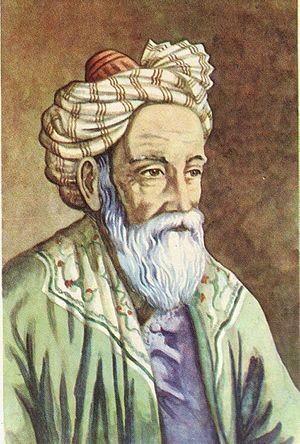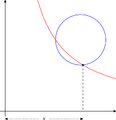Khayyam facts for kids
Quick facts for kids
Omar Khayyam
|
|
|---|---|
 |
|
| Born | 18 May 1048 |
| Died | 4 December 1131 (aged 83) |
| Nationality | Persian |
| School | Islamic mathematics, Persian poetry, Persian philosophy |
|
Main interests
|
Mathematics, Astronomy, Avicennism, Poetry |
Omar Khayyam (born May 18, 1048 – died December 4, 1131) was a famous Persian mathematician, astronomer, and poet. He was born in Nishapur, a city in northeastern Iran. He lived most of his life near the courts of rulers from the Karakhanid and Seljuq families. This was a time when the First Crusade was happening.
Contents
Omar Khayyam's Discoveries
Omar Khayyam was a brilliant thinker. He made important contributions in many areas. His work in mathematics, astronomy, and poetry is still remembered today.
Mathematics and Equations
As a mathematician, Omar Khayyam is best known for his work on cubic equations. These are equations where the highest power of a variable is three (like x³). He found ways to solve these equations using geometry. He did this by showing how different curved shapes (like circles and hyperbolas) could cross each other.
Khayyam was likely the first to create a general way to understand cubic equations. He was also the first to solve every type of cubic equation using geometry, especially for positive answers. His written work on algebra explains his ideas about cubic equations. It has three main parts. The first part deals with equations that can be solved using a compass and straight edge. The second part covers equations that need conic sections to solve them. The third part looks at equations that involve the inverse of an unknown number.
Astronomy and the Calendar
As an astronomer, Khayyam designed the Jalali calendar. This is a solar calendar, meaning it is based on the Earth's movement around the sun. It is known for being very accurate. The calendar uses a special system to add extra days every 33 years. This helps keep the calendar in line with the seasons.
Poetry and Fame
Omar Khayyam's poetry has made him very famous in modern times. This is largely thanks to Edward FitzGerald. In 1859, FitzGerald translated some of Khayyam's verses into English. His book, called Rubaiyat of Omar Khayyam, became incredibly popular.
The Rubaiyat contains loose translations of Khayyam's "quatrains." A quatrain is a stanza, or section of a poem, that has four lines. FitzGerald's book was so successful that by 1929, over 300 different versions had been published. Many more have been printed since then.
Legacy and Honors
Omar Khayyam's work and life have been honored in many ways.
The lunar crater Omar Khayyam on the Moon was named after him in 1970. A minor planet (a small object orbiting the sun) was also named after him. This planet, called 3095 Omarkhayyam, was found by Soviet astronomer Lyudmila Zhuravlyova in 1980. Omar Khayyam's life story was even made into a movie in 1957, simply titled Omar Khayyam.
Images for kids
-
"A Ruby kindles in the vine," an illustration for FitzGerald's Rubaiyat of Omar Khayyam by Adelaide Hanscom Leeson (around 1905).
-
A statue of Khayyam at the United Nations Office in Vienna. It is part of the Persian Scholars Pavilion, given by Iran.
-
A statue of Omar Khayyam in Laleh Park in Tehran. It was made by Abolhassan Sadighi.
-
A statue of Omar Khayyam in Bucharest.
-
A statue of Omar Khayyam in his hometown, Nishapur.
-
A monument to Omar Khayyam in Ciudad Universitaria, Madrid.
See also
 In Spanish: Omar Jayam para niños
In Spanish: Omar Jayam para niños













